Conceptual Approaches to Adolescent Online Risk-Taking
Vol.4,No.1(2010)
Adolescent; Online; Risk-Taking; Social-Compensation; Rich-Get-Richer
Kathryn Stamoulis
Temple University, Philadelphia, USA
Dr. Stamoulis holds a Ph.D. in Educational Psychology from Temple University. She resides in New York City and works as a counselor and adjunct faculty at Temple University, specializing in adolescent development and Internet behaviors. She is Secretary of APA’s Division 46 Media Psychology and also serves as an associate editor of their Newsletter, The Amplifier.
Frank Farley
Temple University, Philadelphia, USA
Dr. Farley, a native of Canada, holds a Ph.D. from the Institute of Psychiatry, University of London, England. He is a leader in American and International psychology, being a former President of the American Psychological Association and six of it’s divisions including the Division of Media Psychology, and former president of the American Educational Research Association. He is an expert in several areas, including child and adolescent development, the Internet, and education.
Agnew, N. & Pike, S. (2007). The Science Game: An Introduction to Research in the Social Sciences. Don Mills, Ontario, Canada; Oxford University Press.
Beebe, T., Asche, S., Harrison, P. & Quinlan, K. (2004). Heightened vulnerability and increased risk-taking among adolescent chat room users: Results from a statewide school survey. Journal of Adolescent Health, 35(2), 116-123.
Gross, E. (2004). Adolescent Internet use: What we expect, what teens report. Applied Developmental Psychology, 25, 633-649.
Harrant, V. & Vaillant, N. (2008). Are women less risk averse than men? The effect of impending death on risk-taking behavior. Evolution and Human Behavior, 29(6), 369-401.
Kraut, R., Olson, J., Banaji, M., Bruckman, A., Cohen, J., & Couper, M. (2004). Psychological research online: report of board of scientific affairs' advisory group on the conduct of research on the Internet. American Psychologist, 59(2), 105.
Lee, S. J. (2009). Online Communication and Adolescent Social Ties: Who benefits more from Internet use? Journal of Computer-Mediated Communication,14, 509-531.
Livingstone, S., & Helsper, E. (2007). Taking risks when communicating on the Internet: The role of offline social-psychological factors in young people's vulnerability to online risks. Information, Communication & Society, 10(5), 619-644.
Peter, J., Valkenburg, P., & Schouten, A. (2005). Developing a model of Adolescent friendship formation on the internet. CyberPsychology & Behavior, 8, 423- 430.
Percy, L. (1976). An argument in support of ordinary factor analysis of dichotomous variables. Advances in Consumer Research, 3, 143-148.
Sheldon, P. (2008). The relationship between unwillingness-to-communicate and students’ Facebook use. Journal of Media Psychology, 20, 67-75.
Wolak, J, Mitchell & Finkelhor, D. (2003). Escaping of connecting? Charectersitcs of youth who form close online relationships. Journal of Adolescence, 26, 105-119.
Wolak, J, Finkelhor, D & Mitchell, K. (2007). Is talking to unknown people always risky? Distinguishing online interaction styles in a national sample of youth Internet users. CyberPsychology & Behavior, 11(3), 340-343.
Wolak, J., Finkelhor, D. Mitchell, K. & Ybarra, M. (2008). Online “predators” and their victims. Myths, realities, and implications for prevention and treatment. American Psychologist, 63(2), 111-128.
Introduction
The Internet is an integral part of many adolescents’ lives. Ninety-one percent of adolescents in the United States report occasional or daily Internet use (Gross, 2004). While there are great benefits to Internet use, adolescent online interpersonal communications are arousing great public concern. Specifically there is concern over giving out personal information and interacting with strangers (Livingston & Helsper, 2007). This fear may be justified. A recent US survey found that forty-nine percent of the adolescents interviewed communicated with strangers online (Wolak, Finkelhor & Mitchell, 2008). Ybarra, Mitchell, Finkelhor and Wolak (2007) found that based on the number of potentially risky behaviors online youth engaged in, the incidents of online harassment and unwanted sexual solicitation increases.
It is important for educators and psychologists to have a conceptual understanding of adolescents who are engaging in risky online behaviors. Conceptual approaches have emerged to explain adolescent online behaviors, but not risk-taking behaviors (Lee, 2009). This study will add to the existing literature by specifically addressing adolescent risk-taking behaviors using a nationally representative sample. Two opposing theories have been proposed by the literature to explain online social interactions. Although the theories are geared towards general interpersonal online communication, they will be explored in this study as possible frameworks to explain adolescent online risk-taking. The present study attempted to determine which of these conceptual approaches are most fitting by looking at predictors of online risk-taking using data from the Pew Internet Foundation.
The Rich Get Richer Approach
This approach postulates that the Internet primarily benefits extraverted people. It is extraverted and/or non-lonely individuals that utilize online communication. These people already have strong social skills and the Internet is utilized as another venue to interact with friends (Sheldon, 2008). Kraut (2002) argues that people who are skilled in effectively using the world’s resources to enhance their social lives are well positioned to do the same on the Internet.
This theory can be adapted to look at risk-taking in this study because many of the risk-taking variables have to do with stranger interaction. Adolescents may view chatting with strangers online and posting personal and contact information about themselves as a way to add to their current repertoire of friends. Therefore, the adolescents in the present study who spend time with friends doing social activities outside of school or talking on the phone may have social skills that motivate them to interact with strangers online in the hopes of adding to their reserve of friends.
Some of the research lends support to the Rich Get Richer Conceptual Approach. Peter, Valkenburg and Schouten (2005) sought to determine the predictors of online friend formation and found that introverts are less likely to make friends online because they communicated and self-disclosed less often than extraverts. Sheldon (2008) surveyed 172 Facebook users at a large Southern United States university and found that students who view offline interpersonal communication as rewarding (versus those who found it uncomfortable) had more Facebook friends and initiated more online friendships.
Social Compensation Approach
In an opposing theory, the Social Compensation Conceptual Approach postulates that the Internet primarily benefits introverted people (Sheldon, 2008). Adolescents communicate online because they are dissatisfied with their offline lives and need to compensate for their lack of personal relationships. The Internet is a safe place to do so because they can overcome shyness and apprehension when safely sitting behind a screen. The reduced auditory and visual cues an online conversation carries could possibly reduce social anxiety (Gross, 2002).
There is a hypothesis that those who engage in risky behaviors online are more dissatisfied with their offline life (Livingstone & Helsper, 2007). This theory can be modified to include risk-taking online because posting personal and contact information about oneself and communicating with strangers is a way to meet new people. Therefore, the adolescents in the present study who don’t spend time with friends in-person, engage in social activities outside of school or talk on the phone may lack social skills that motivate them to interact with strangers online in the hopes of making friends.
Research lends support to this theory. Wolak, Finkelhor, Mitchell and Ybarra (2008) found that adolescents who interact with strangers online are more likely to report offline victimization such as bullying compared to adolescents who limit online communication to friends. They also found engagement in four risk behaviors (i.e. posting photographs, personal information, etc.) led to an 11.3 greater chance of being the victim of unwanted sexual solicitation and harassment. Similarly, Livingstone and Helsper (2007) found for adolescents that were dissatisfied with offline life and valuing the anonymity of Internet communication were predictors of posting personal information about oneself.
The research has not conclusively supported either conceptual approach. For example, Peter, Valkenburg & Schouten (2005) assert that adolescents who are lonely, lack social skills or are shy may interact with strangers in chatrooms to compensate for their difficulty forming friendships offline. However, the same study found that only introverts that had a strong motivation for social compensation and communicated and self-disclosed often created friends online. Neither the Social Compensation Conceptual Approach nor the Rich Get Richer Conceptual Approach has been crafted specifically to frame adolescent online risk-taking. . Although neither framework has appeared as a clear winner in conceptualizing online interpersonal communication, the present study hypothesizes the Social Compensation Approach will best explain adolescent online risk-taking.
Method
The present study consists of a secondary data analysis of information obtained from the 2006 Parents and Teens Survey of the Pew Internet & American Life Foundation Project. The sample was designed to represent all adolescents’ ages 12-17 living in the continental United States. Weighting was used to compensate for patterns of nonresponse that might bias responses. The parameters were based on an analysis of the 2005 Census Bureau.
List-assisted random digit dialing was used from previous Pew Internet & American Life Project efforts fielded in 2004-2006. Households with a child age 17 or younger were contacted and screened to find 12-17 year-old children. The total participants are 935 parents of 12-17 year-olds and 935 12-17 year-olds. Of the 935 teens, 886 used the Internet. The data in the present study come from the sample of 886 online teens. Interviews were conducted from October 23 to November 19, 2006. The response rate for the survey was forty-six percent.
Instrumentation
The Parents & Teens 2006 Survey
The survey consists of 135 items. It is broken down into a parent survey and a teen survey. The Teen Survey consists of 109 items. The survey includes items on computer and technology usage, computer and technology ownerships, general perception of the Internet, social/after school activities, privacy issues, reasons for engaging in social networking sites, effects of Internet usage, stranger contact and video game use. The items include multiple choice, dichotomous answer formats and likert-type scales for Internet usage (1 = several times a day to 6 = never).
Variables
Independent Variables
In addition to age, gender and employment in a part-time job, the frequency of Internet use, time spent with friends in-person, time spent talking on a landline telephone and time spend talking on a cell phone were measured. Responses were measured using a likert-scale. Four variables pertaining to afterschool activities were aggregated into one variable defined as “participation in an afterschool activity”. This decision was made to prevent multicollinearity.
Dependent Variables
The dependent variables listed in Table 4 are included because they have been defined as risk-taking behaviors in prior research. Wolak, Finkelhor and Mitchell (2008) found that they are associated with an increase in unwanted sexual solicitation and harassment. This is also supported by other studies (Beebe, Asche, Harrison & Quinlan, 2004; Livingstone & Haddon, 2008). With the exception of “responds to stranger contact”, all the dependent variables were measured by dichotomous yes/no responses. To obtain the variable of “responds to stranger contact”, responses to the question of “Thinking about the last time you were contacted online by someone who was a complete stranger to you, how did you respond?” was dummy coded. Only the response of “respond so you could find out more” was included as the risk taking variable. Responses of “tell an adult or someone in authority, “just ignore or delete it”, “responds and tell them to leave you alone” or “other” and “don’t know/refused” were not viewed as risky.
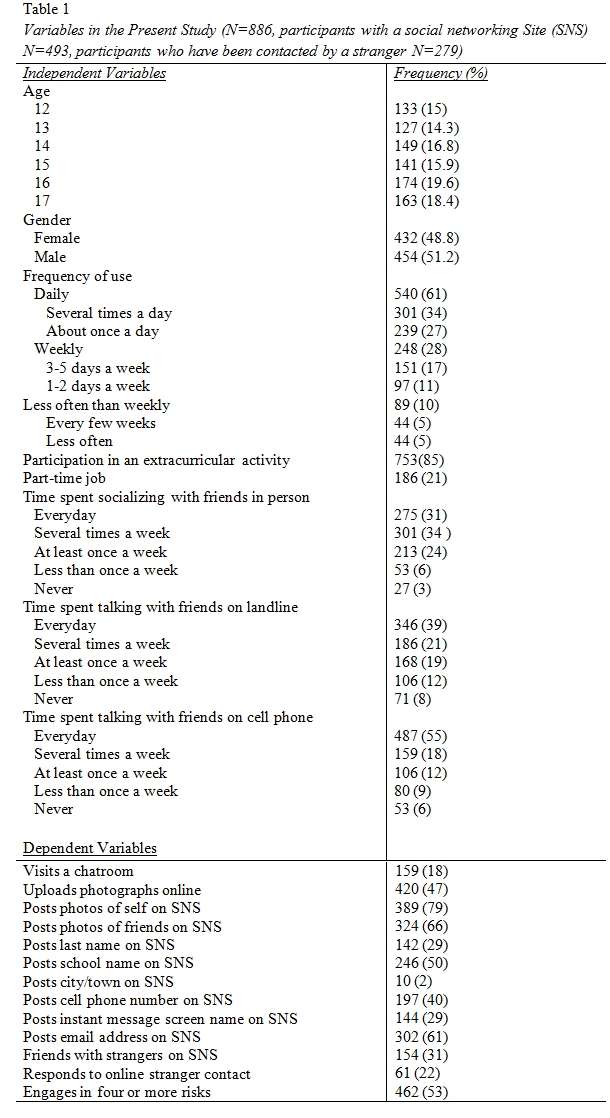
Frequency of stranger contact
Although not considered a risk-taking variable, it is informative to understand how many teens have been contacted by strangers online. The percentage of teens who have been contacted by strangers online is listed in Table 2. The total for all adolescents are presented as well as the percentages for boys and girls. An independent t-test was computed to ascertain statistical significance. Results are listed in Table 3. Table 1 reports the percentage of teens who have responded to online stranger contact (a risky behavior).
Data Analysis
Factor analysis was conducted to reduce the many dependent variables into a limited number of factors. Four factor scores were obtained that were then used as the criterion variables in future analyses. Because Wolak, Finkelhor, Mitchell and Ybarra (2008) identified engagement of 4 or more risk-taking variables as a good cut-off point to identify adolescents who are in the most danger of receiving unwanted sexual contact online, the risk-taking variables were also computed so that teens who engaged in four or more risk-taking behaviors became another criterion variable. In addition to the four factor scores, this was used as the fifth criterion variable in the multiple regression analyses.
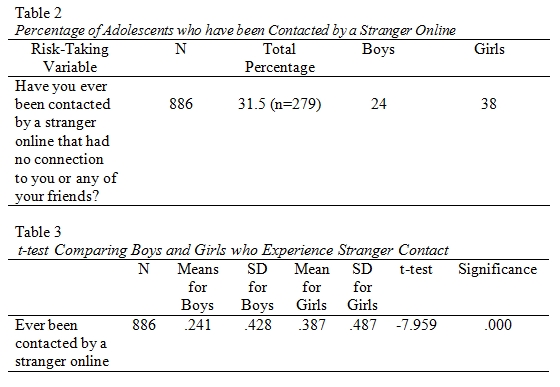
The results indicate that girls have been contacted by strangers online significantly more than boys.
Factor Analysis
A factor analysis was conducted to provide an exploration and detection of patterning of the risk-taking variables. Factor analysis using dichotomous variables can be effectively utilized (Percy, 1976). A principal components factor analysis followed by a varimax rotation was performed on the twelve identified risk-taking variables. The analysis produced four factors with eigenvalues greater than one. The rotated factor matrix is presented in Table 4.0.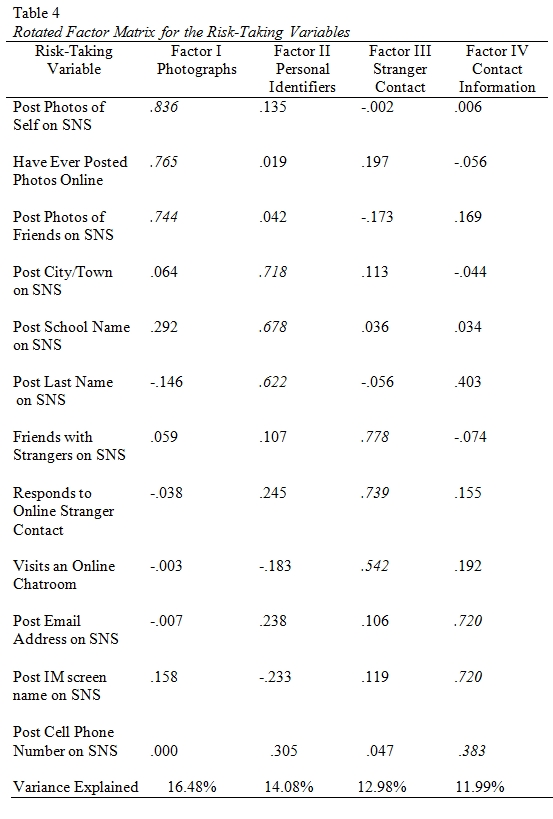
The results from the Factor Analysis produced four clear factors accounting for 55.54% of the variance explained. Factor I will be called Photographs; it accounted for 16.48% of the variance. All of the items on Factor I pertain to posting photographs online. Factor II will be labeled Personal Identifiers; it accounted for 14.08% of the variance. All of the items on Factor II pertain to posting information on an online social networking site. Factor III will be labeled Stranger Interaction, it accounted for 12.98% of the variance. Factor III items include having strangers as friends on a social networking site, responding to stranger contact and visiting chatrooms. The last factor, Factor IV will be labeled Contact Information; it accounted for 11.99% of the variance. All three of the items on Factor IV include posting to social networking sites ways to be contacted. The four factors obtained in this analysis were used as criterion variables in the subsequent regression analyses.
Predictors of Online Risk-Taking
Multiple regression analysis was conducted to determine the predictors of online risk-taking. The predictor variables used in each regression include: Age, Participation in an Extracurricular Activity, Time Spent with Friends In-Person, and Time Spent Talking to Friends on a Landline Phone, Time Spent Talking on a Cell Phone and holding a Part-Time Job. The criterion variables are the four factors that emerged from the factor analysis as well as engaging in four or more risk-taking behaviors. Prior researchers have noted that engaging in four or more risky online behaviors is especially disconcerting and should be noted by professionals (Wolak, Finkelhor, Mitchell & Ybarra, 2008). Therefore the “Four or More Risks” criterion was also looked at beyond the factor scores that emerged. To ascertain if gender has a significant effect on the results, multiple regressions were also computed separately for boys and girls. These results are presented in Table 5 through Table 9,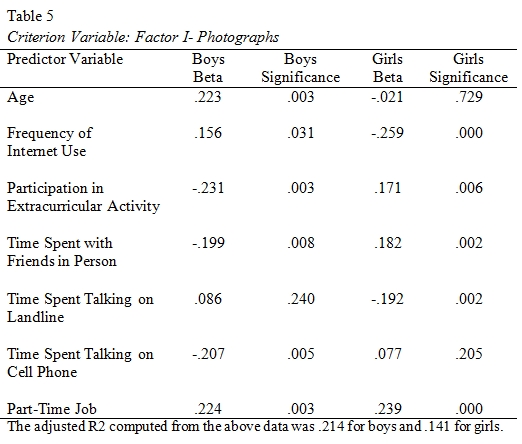
For boys, predictors of Factor I-Photographs are: older teens, higher frequency of Internet use, lack of involvement in an extracurricular activity, less time spent talking on a cell phone and having a part-time job. For girls, predictors of Factor I, Photographs are: lower use of the Internet, participation in activities, more time spent socializing outside of school with friends in person, less time talking with friends on a landline telephone and having a part-time job.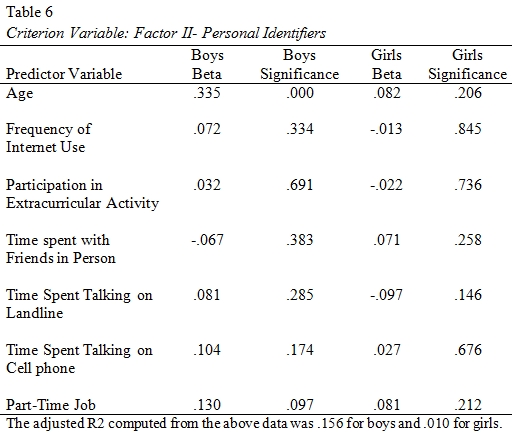
A predictor of Factor II-Personal Identifiers for boys is being an older teen. There were no significant predictors for girls.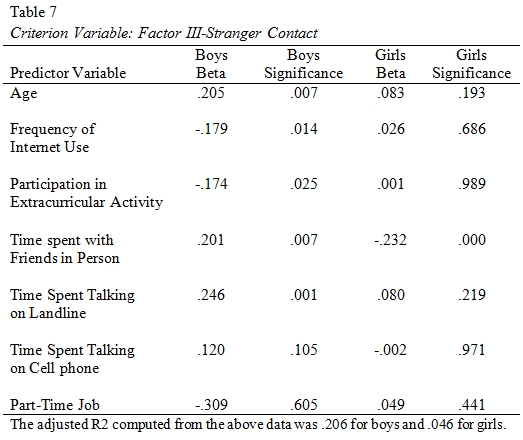
Predictors of Factor III-Stranger Contact for boys are being an older teen, lack of participation in extracurricular activities, more time spent with friends in person and more time talking with friends on the landline. Predictors for girls are spending less time socializing with friends in person.
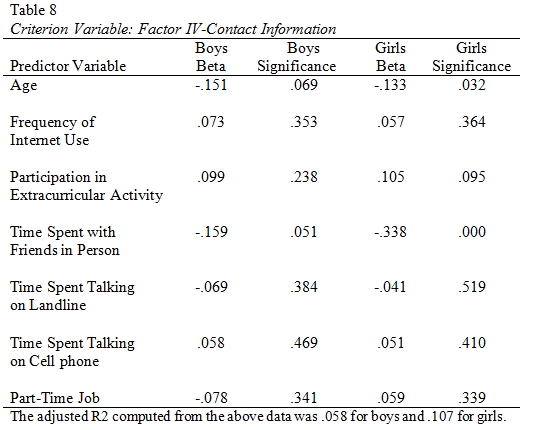
There were no significant predictors for Factor IV-Contact Information for boys. Younger teen girls and teens that spend less time socializing with friends in person are more likely to post their contact information on their social networking site.
Lack of participation in extracurricular activities and more time spent talking to friends on a landline are predictors for boys engaging in four or more risks. For girls the only significant predictor is less time spent socializing with friends in person.
Discussion
These findings strongly support the Social Compensation Approach, which postulates the Internet primarily benefits introverted people and was adapted to examine adolescent online risk-taking. A lack of involvement in extracurricular activities was a predictor for several risk-taking factors, especially for boys. Also a common predictor for risk-taking factors was infrequent time spent socializing with friends in person, especially for girls. The criterion variable of “Four or More Risks” warrants a special look as the research suggests that teens meeting this criterion are especially in jeopardy (Wolak, Finkelhor, Mitchell & Ybarra, 2008). Lack of involvement in extracurricular activities was a significant predictor of “Four or More Risks” for boys and less time spent socializing with friends offline was a significant predictor for girls.
The adolescents in this study appear to engage in risky online behaviors to compensate for minimal social interactions in their offline lives. They may be motivated to interact with strangers online in hopes of making friends and social connections. Therefore, adolescents may be more willing to assume the risks associated with communicating with strangers and posting personal and contact information online.
The exception to the above was items pertaining to posting photographs online. Girls who post photographs online were more likely to spend time socializing with friends offline, participate in extracurricular activities and spend less time online. Girls fall under the Rich Get Richer Approach when posting photographs online. In other words, girls who spend a lot of time with friends and in activities are social people and like to showcase that social side of themselves online. It is possible that for girls, posting photographs online is not an inherently risky behavior. For boys posting photographs appears to be more of a compensatory behavior. Boys who spend less time with friends in person and are not involved in extracurricular activities compensate for that by showing the online world photographs of themselves and friends. This supports the Social Compensation Approach.
It should also be noted that time spent talking with friends on either a cell phone or a landline telephone and time away from a computer at a part-time job did not serve as a protective measure against online risk-taking and in some cases predicted certain risk-taking behaviors. Therefore speculation can be made that behaviors that guard against adolescent online risk-taking need be face to face socializing or involvement in activities.
Socially isolated youth and those with a lack of participation in activities may be more likely to be lonely, isolated or depressed than those that participate in extracurriculars and are not socially isolated (Schraedley, Gotlib & Hayward, 1999, cited in Wolak et al., 2003). Adolescents who are lonely, isolated or depressed may be going online in search of connection with others. While this may not be a bad thing for every teen that does so, it is troubling as teens who engage in online risk-taking have an increased chance of online sexual solicitation and harassment (Wolak, Finkelhor, Mitchell & Ybarra, 2008).
With the exception of Factor I-Photographs (girls only), all of the results from the multiple regressions lend support to the Social Compensation Conceptual Approach. What is likely the most perilous variable, Four or More Risks, strongly supports the Social Compensation Conceptual Approach. In particular, teens who engage in four or more risks online spend less time with friends in person and don’t participate in extracurricular activities. This is a very important finding as it is a means to identify teens who may be at the greatest risk online.
Limitations
The results are based on survey data, which at its core yields general information (Agnew & Pike, 2007). In order to gain a deeper understanding, researchers should utilize other research methods. More detailed information could be of value, especially pertaining to the protective value of spending time socializing with friends outside of school and engaging in extracurricular activities. The data from survey research is obtained through self-report thus there could have been biased responding due to less than accurate recall or discomfort surrounding sensitive questions. Hence there may be a discrepancy between what teens report and what they actually do. Despite the limitations, the results from this study contribute to the empirical knowledge base by providing a conceptual understanding of adolescent online risk-taking.

This work is licensed under a Creative Commons Attribution-NonCommercial-NoDerivatives 4.0 International License.
Copyright © 2010 Kathryn Stamoulis, Frank Farley
